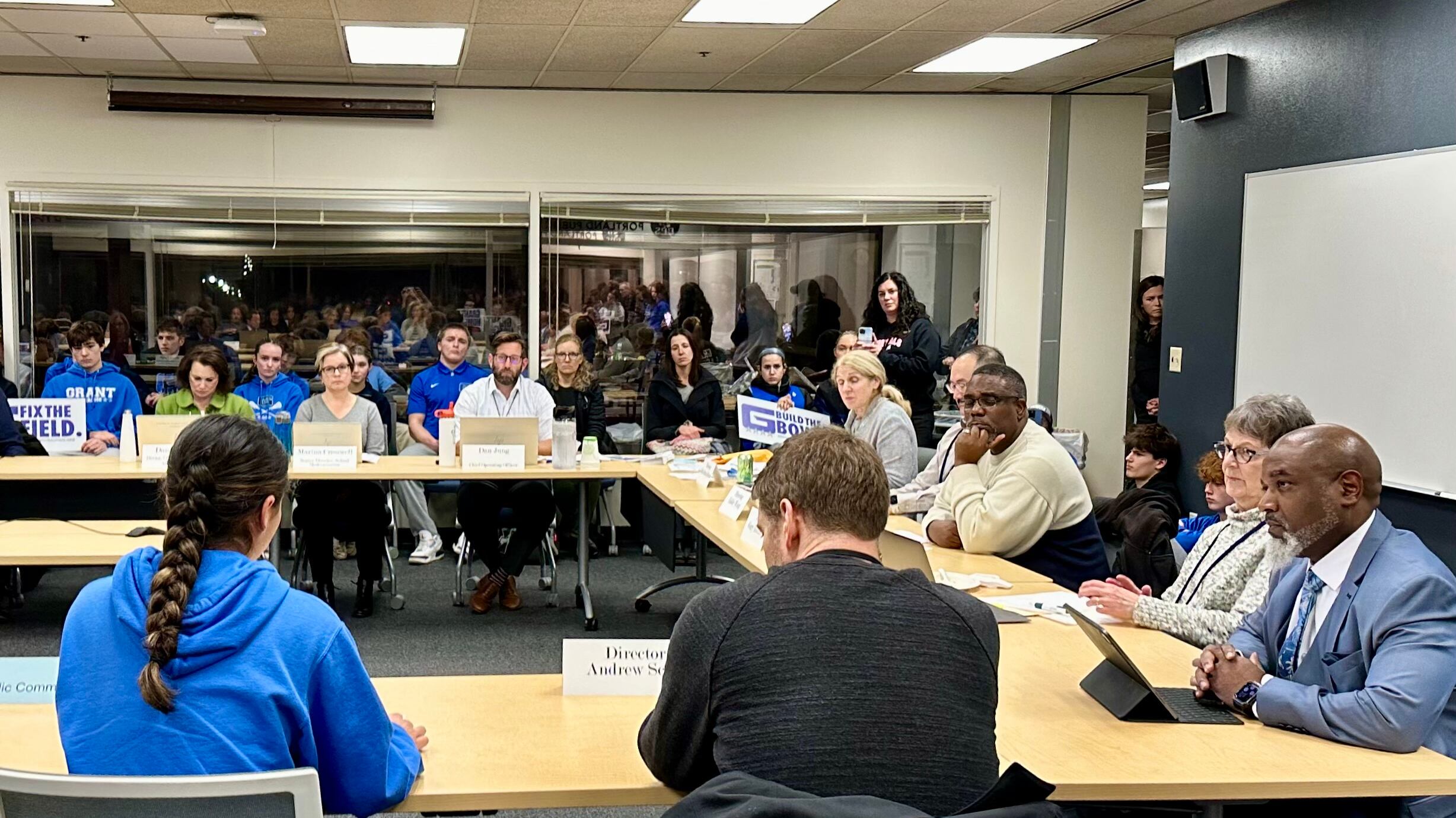Emboldened by getting new turf on their field, Grant High School athletes and their parents swarmed a Portland Public Schools Board committee meeting Wednesday night to plead for lights at Grant Bowl.
Grant is the only school in the Portland Interscholastic League—and the only 6A school in the state—that doesn’t have an athletic field with lights. That means that students must play many home games at Delta Park and other far-flung fields, with travel cutting into instruction time. Grant Bowl doesn’t have seating, either.
Grant parent Kim McGair asked the PPS Board’s facilities and operations committee to add lights at Grant to a resolution authorizing new bleachers for Roosevelt High School and final payment on a field house at McDaniel High School. Roosevelt has stands that seat 800. School Board member Herman Greene introduced the resolution to boost that number to 1,500 and add 800 more for visitors at a cost of $2.5 million.
PPS Board staff said it would cost the same amount to add lights at Grant, with much of the expense coming from improvements that must be done to make the facility compliant with the Americans with Disabilities Act, including new walkways. Staff advised that the lights project would achieve economies of scale if it were done later, at the same time as bleachers.
McGair said waiting was unfair to Grant because it has been without lights for decades.
“Grant is the only school in the PIL that can’t have night home games and whose varsity teams must travel to other facilities for a majority of their games because of a lack of lights,” McGair said at the meeting. “Grant student athletes missed 1,000 hours of instructional time to play their home games just this fall. You can put Grant athletes back in the classroom by putting lights on our field.”
The Grant Bowl Community Coalition, co-founded by McGair, was instrumental in getting Portland Parks & Recreation to lease Grant Bowl to Portland Public Schools, then have the school district replace compacted turf that had become a concussion hazard.
Kate Ratanaproeksa, a varsity soccer and lacrosse player, testified that she had played only four games at Grant in three years.
“What we are asking for isn’t unreasonable,” Ratanaproeksa said. “We are simply asking for what every other school in the PIL has.”
After testimony on Grant, the board committee turned to Roosevelt. Greene introduced the resolution, saying that while Roosevelt had stands (and lights), the stands were in disrepair and were smaller than at other schools.
“We have continued to put off doing the Roosevelt grandstands,” Greene said. “It’s always pushed to the next time some money comes. And that day has never come. Stop kicking the can down the street.”
No one testified on the matter, and no board member asked to amend the resolution to include money for lights at Grant. The committee voted 4-0 to send the resolution to the full School Board at its next meeting.
The move irked Grant athletes and parents.
“More than 50 Grant athletes attended this meeting to ask the board to install lights at Grant,” McGair said afterward. “What they heard from PPS staff is that it would cost $2.5 million because of some additional required upgrades and, as a result, the board committee didn’t move forward. The very next minute, they listened to the board committee vote unanimously to approve spending $2.5 million to build new stands at Roosevelt after almost no discussion—a school that already has both lights and stands, while Grant has neither.”
School Board member Julia Brim-Edwards, who sits on the facilities and operations committee, said she has already contacted the city of Portland about getting a variance to make it easier to install lights at Grant and that she supports the project.
“We’ve made a lot of progress,” Brim-Edwards tells WW. “We got the turf replaced, and we got a long-term lease. The next step is the lights. Roosevelt should get their stands, and Grant should get their lights and stands, because that’s what’s equitable. Just because we are doing the right thing for Roosevelt doesn’t mean that we’re not going to do the right thing for Grant.”

